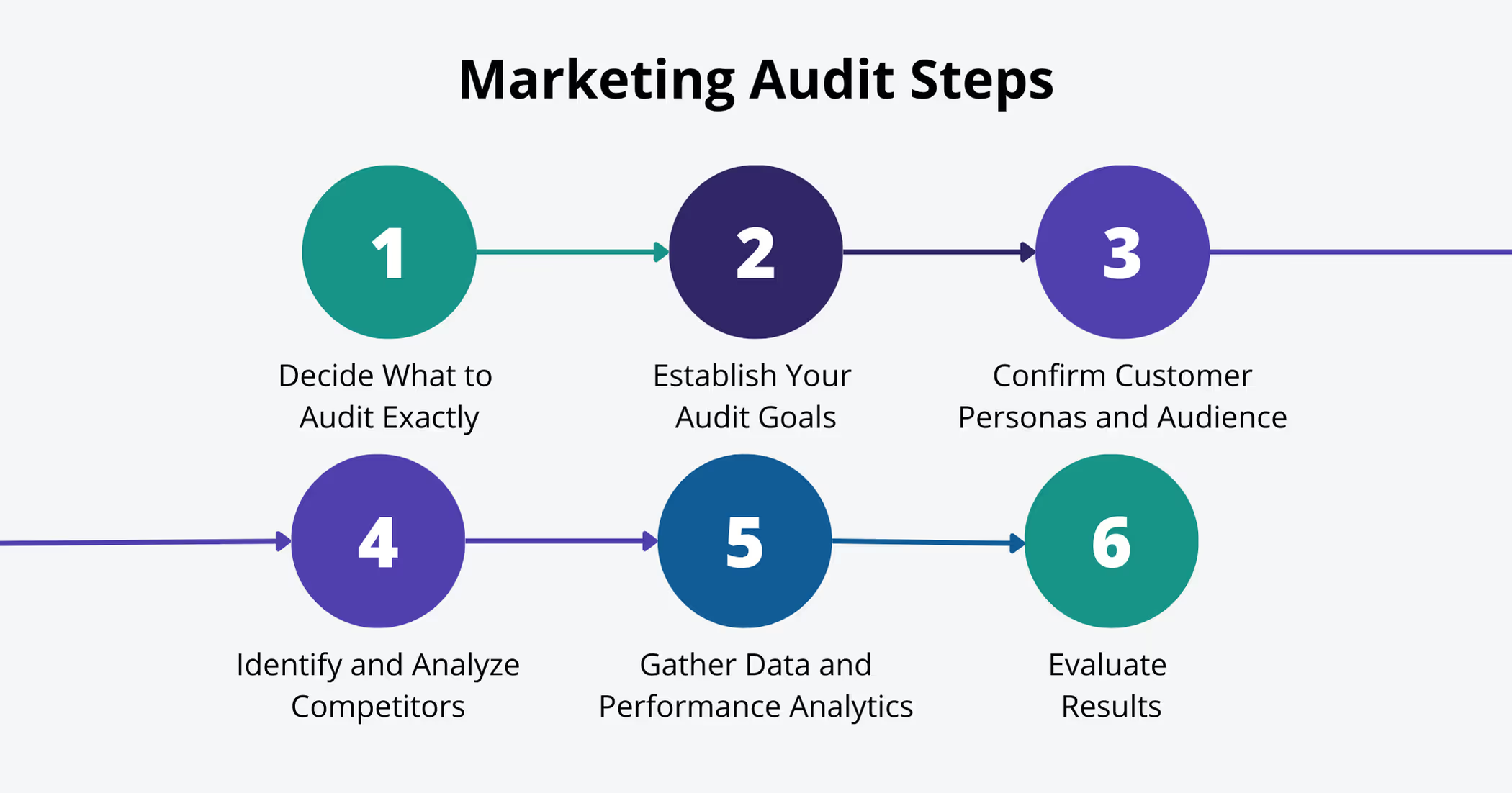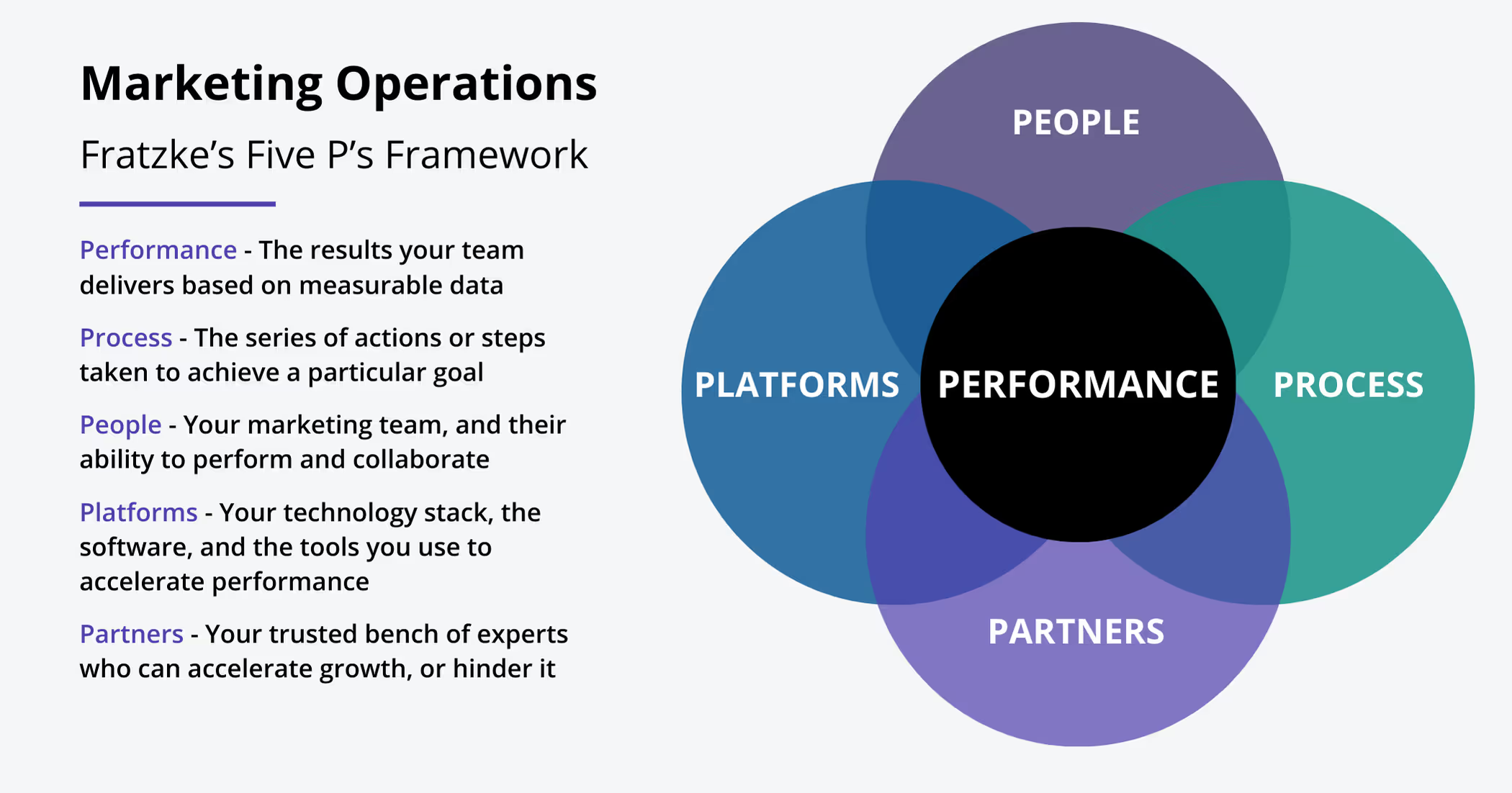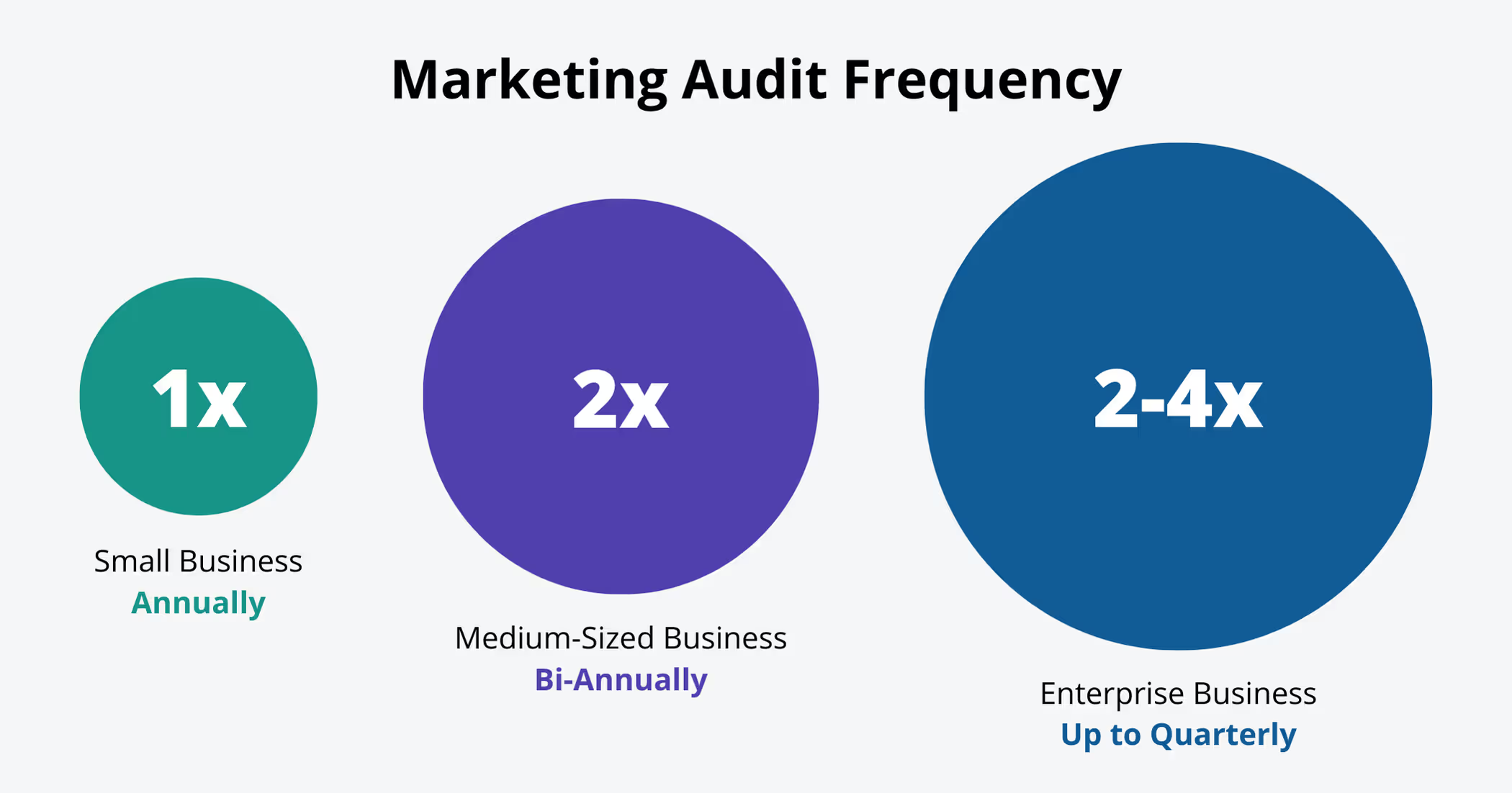Whether you're a small business or a large enterprise, you likely invest a considerable amount of time and budget on your marketing efforts. And, for good reason! Effective marketing is critical for business growth.
One of the best ways to increase your return on investment (ROI) is a marketing audit.
A marketing audit is a comprehensive review of all marketing elements and practices. By conducting a marketing audit, you can determine the effectiveness of your efforts, identify areas where your strategy may be lacking, and gain valuable insights that can enhance your business's return on investment.
We’re here to walk you through the concept of a marketing audit, how to do it, and highlight best practices so you can make data-driven decisions to drive growth in your business and elevate your marketing strategy to optimize your ROI.
Marketing Audit 101
In this article, we will outline everything you need to know about marketing audits by covering these topics:
- What is a Marketing Audit?
- Who Should Perform a Marketing Audit?
- When Should You Conduct a Marketing Audit?
- How to Do a Marketing Audit? [6 Steps]
- What to Do with Your Audit Results?
- How Often Should You Conduct a Marketing Audit?
- Marketing Audit Best Practices
- Maximizing Your Marketing Performance

What is a Marketing Audit?
A marketing audit involves thoroughly assessing your current marketing strategy to pinpoint strengths and weaknesses. It can act as a guiding light to improve the effectiveness and performance of your marketing strategy by analyzing every aspect of your marketing efforts.
A marketing audit can answer important questions like:
- Is your overall marketing strategy effective?
- What is working well with your current marketing efforts?
- What isn’t working well with your current marketing efforts?
- Are you using the correct channels to reach your target audience?
- Are you missing out on marketing opportunities that your competitors are leveraging?
Let’s go over some more background information that you should know before starting your marketing audit.
Who Should Perform a Marketing Audit?
Let’s face it - it’s hard to find time to step back and assess the success of your marketing efforts due to a host of competing priorities, fire drills and day-to-day responsibilities. It’s also helpful to get an outside, objective, and experienced perspective. This is often why the best way to obtain an objective marketing audit is to use a third party. When a third-party partner conducts a marketing audit, it is known as an external marketing audit.
External marketing audits can be helpful for several reasons:
- Third-party involvement helps provide impartial assessments, evaluations and solutions.
- Outside perspective can help identify blind spots internally and potentially validate correct assumptions.
- A third party will often bring fresh marketing ideas and strategies along with recommendations for actionable insights.
- Conducting an audit requires expertise and experience. External expertise helps provide a comprehensive expertise and specialized knowledge to improve your marketing strategy and overall performance.
- If you don’t have the time and resources to perform an internal marketing audit, a third-party can come in and do the heavy lifting for you.

When Should You Conduct a Marketing Audit?
Marketing campaigns are moving at the speed of light these days with social media, websites, and emails at our fingertips with our phones. You want to make sure that your marketing strategy is delivering results because it is being put in front of your audience every hour of every day.
Trying to navigate the various channels available for reaching your customers can be a cumbersome and daunting task. With a marketing audit, you can identify ways to streamline your efforts so they are focused on the most effective avenues with a refined approach that can help you get the results you want from your marketing strategy.
What’s more, if you're eager to dive deeper into understanding your customers—their preferences, needs, and desires—utilizing a marketing audit, complete with customer personas and competitive analysis, can provide invaluable insights.
Maybe you want to maximize your marketing strategy with a tight budget? A marketing audit offers clarity on where your dollars can make the greatest impact.
In general, we advise our clients to conduct marketing audits regularly, ideally on an annual basis or even every six months. This proactive approach ensures your marketing strategy remains consistently efficient with fresh ideas that get you the best results for your business.
How to Do a Marketing Audit?
Now that you’ve got the rundown of the who, what, and when of marketing audits, let’s talk about how to actually do a marketing audit.
It’s not as easy as a click of a button; marketing audits require expertise, time, and attention to detail so that companies can have access to insights that guide their business towards growth and success.

6 Steps for an Effective Marketing Audit
Here is a high-level overview of the steps an experienced marketing professional will follow for a comprehensive marketing audit.
- Decide What to Audit Exactly
- Establish Your Audit Goals
- Confirm Customer Personas and Audience
- Identify and Analyze Competitors
- Gather Data and Performance Analytics
- Evaluate Results
1. Decide What to Audit Exactly
There are different types of marketing audits that examine various aspects of a company’s marketing campaigns. The two most common are comprehensive audits and systematic audits. Determining exactly what you want to audit is a key decision as it will shape the focus of your marketing assessment.
Comprehensive marketing audits are often used by established businesses to examine critical aspects of marketing data like ROI and lead generation to develop a holistic view of marketing campaigns.
For companies that are still in their growth stage, a systematic marketing audit would be a better choice. This type of audit is more in-depth with assessments of both available data and a company's marketing infrastructure, processes, and strategy. Or, as we like to call it, the 5ps of Marketing Operations: Performance, People, Process, Platforms and Partners.
The choice between a comprehensive and systematic audit depends on your specific needs and marketing goals, which is why we also need to carefully consider the next step of the marketing audit process: establishing goals.

2. Establish Your Audit Goals
Next, you will need to clearly define your audit goals. Having clear audit goals is crucial to continuing the process and the marketing audit itself acts as the compass to gauge whether those goals are being met.
One way to have clear goals is to have concrete metrics that you want to measure against your competitors and best practices. We call these benchmarks and they give categories of marketing metrics that should be audited, tracked, and measured. Using benchmarks can help you to create a framework for setting your audit goals and can be used to make better business decisions faster.
It’s important to make sure that your goals are clear, measurable and actionable. Clear and concise goals ensure your audit aligns with strategic objectives so that at the end of the marketing audit, you’ll have actionable marketing insights that are tailored to your company and industry.
3. Confirm Customer Personas and Audience
After establishing your audit goals, it’s time to confirm customer personas and your audience. You need to have a clear vision of who it is that you’re trying to reach with these marketing efforts. Customer personas are representations of specific segments of your target audience.
If you’re running marketing campaigns that are intended for an audience of 25-40 year old construction project managers, but your actual marketing campaign is using high-level technology verbiage, you’re likely not going to be making many conversions.
Knowing your customer persona and audience gives you a clear target of the audience you are seeking to reach with your marketing campaigns.
Sometimes multiple customer personas are crafted to mirror distinct segments within the target audience, often categorized as primary, secondary, etc. Tailored to your specific audience for your business and industry, these personas usually revolve around key general traits such as:
- Age range
- Gender
- Income
- Education
- Professional details
- Personal tastes and interests
These traits (and sometimes others) create a comprehensive makeup of a customer persona. These customer personas serve as a valuable tool for understanding and positioning against competitors, which is another essential step in the marketing audit process.

4. Identify and Analyze Competitors
Now it’s time to take a look at your own competitors. Leveraging a marketing audit can give you a magnifying glass to examine your competitors and answer questions like:
- What marketing strategies are they using that are bringing in results?
- What marketing strategies are they using that appear to be a major waste of time and money (i.e. what NOT to do)?
- Where are their gaps and blindspots that you can fill with marketing to drive your own business?
You can’t exactly control what your competitors are doing, but you can use their public data from marketing campaigns to conduct research to better understand their marketing efforts, strategy and positioning. This can help identify gaps and opportunities that you could be taking advantage of. You can also use this information to help fuel new learnings, ideas, and strategies to better connect with your target audience, which can help grow market share.
5. Gather Data and Performance Analytics
As with most audits, the heart and soul of the marketing audit process is data. The way in which data is collected for each marketing audit depends on each company’s platforms and strategy.. Metrics are pulled from measurable components of marketing campaigns such as:
- Customer engagement percentages
- Organic leads from specific campaigns
- Percentage of website traffic from mobile devices
- The speed of your website
- Ad click-throughs
Plus, dozens of other key performance indicators (KPIs). While these may seem like inconsequential facts or trends to an outsider, marketing audit professionals see these metrics as strokes of paint on a canvas that all come together to create a picture of how exactly your marketing efforts are (or aren’t) working for your business.
At this stage in the marketing audit, the data that is gathered and analyzed, providing a window into the strengths and weaknesses throughout your current marketing strategy. This allows your campaigns to be refined and optimized for ROI.

6. Evaluate Marketing Performance
We made it to the last step of your marketing audit! The data that has been gathered and analyzed needs to be evaluated by a marketing audit professional.
An evaluation of the marketing audit will highlight key takeaways, with auditors looking at each piece of data individually and also its contribution to the overarching performance of your marketing efforts.
All of the components that are used in marketing– website copy, graphics, advertising channels, etc.--are intricately connected, influencing each other's dynamics and possibly performance.
This is the point where it is essential to have an experienced third-party auditor who comprehends these relationships, understands your goals and target audience, and can provide informed recommendations to optimizes your marketing strategy.
What to Do with Your Audit Results
At this point in the marketing audit process, you’ll have powerful information in your hands. This information has the power to optimize your marketing, drive growth, and deliver results. These actionable insights remove much of the guesswork, guiding the creation of an optimized marketing strategy for the current market in your industry.
Here’s an example that could be applicable to any company: if a particular channel isn't generating leads, redirecting the budget to a high-performing channel could be a key takeaway. Identifying missed opportunities allows you to integrate them into your future strategy.
Your audit results put you in the driver’s seat to make informed decisions about the direction of your marketing efforts. So if you’re wondering what to do with your audit results, it’s as simple as this: use them to drive your company’s growth.
How Often Should You Conduct a Marketing Audit?
Marketing audits provide valuable insights into how marketing campaigns are performing, but as we explained earlier, trends are moving faster than ever. A marketing audit can help to guide marketing campaigns for current and future trends. The quicker you identify what works and what doesn't, the faster you can optimize your marketing campaigns to bring in the results you want.
Marketing audits are usually conducted annually, although some companies or industries may benefit from conducting marketing audits at six-month intervals. The frequency may depend on factors like budget and industry. Conducting more frequent audits ensures the availability of up-to-date information, which can act as a guide for optimized marketing decision-making throughout the year.

Marketing Audit Best Practices
As with any marketing deliverable, marketings audits range in their depth and complexity. Some are more basic, providing limited information, and some provide a more in-depth and comprehensive review with valuable insights that can be leveraged for measurable company growth.
Here are some marketing audit best practices you should expect:
- A comprehensive marketing audit should explain effective techniques and strategies.
- It should propose solutions for both short-term and long-term plans.
- A quality marketing audit will not only pinpoint issues but also outline specific actions and steps to address them, aligning with your overarching marketing goals.
An experienced third-party marketing auditor will also deliver specific deliverables and valuable services with your marketing audit such as:
- A comprehensive audit report (views, bounce rates, keyword usage, etc.)
- Detailed performance benchmarks
- Analyzed intel from competitors
- Recommendations for short-term and long-term action items
- An audit review session
- Ongoing support
Maximizing Your Marketing Performance
You could have the best marketing team that money can buy, but even the best performers can benefit in receiving the valuable insights and data that an external marketing audit can provide.
To maximize your marketing performance, regular marketing audits should be conducted to provide valuable data about the performance of marketing efforts like email campaigns, advertising, social media marketing, organic growth and more.
Marketing audits uncover the smaller details that can be pulled from performance metrics, like bounce rates, as well as how they fit into the bigger picture that determines the ROI of your marketing efforts. Marketing audits are the part of business that pulls back the curtain on marketing campaigns to show if it’s running like a well-oiled machine or if some parts need to be replaced. You can maximize your marketing performance with a marketing audit performed by a trusted professional.




